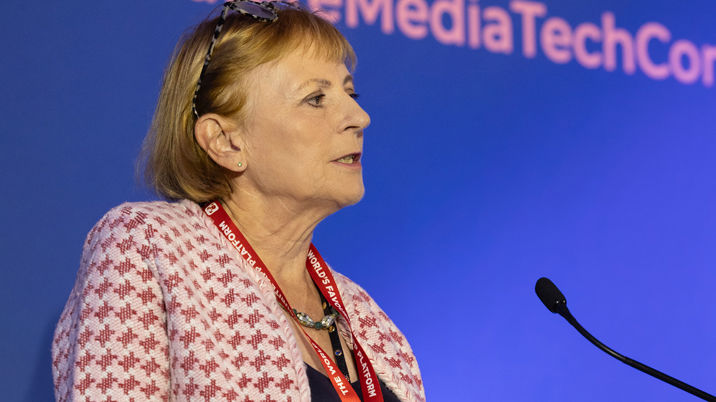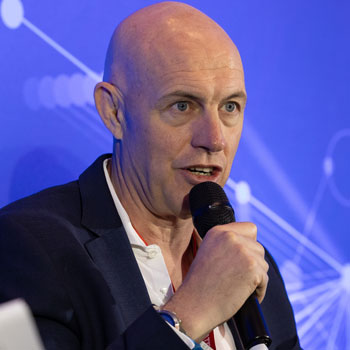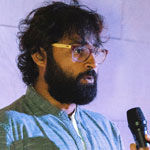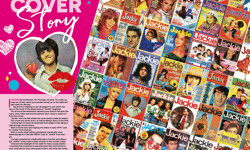
Cue dramatic music and voiceover by Idris Elba and Gillian Anderson:
“This is a story of love, betrayal, bereavement, redundancy, arrest, mental breakdown and a death-defying car crash. But it also lifts the lid on the REAL story behind what happens at Britain’s best-selling magazines.”
All sound a bit far-fetched? Not for Lindsay Nicholson, who for more than twenty years was the grande dame of magazine publishing as editor-in-chief of Good Housekeeping and editorial director of lifestyle brands for Hearst.
And, yes, all of that happened to her as detailed in the candid memoir, Perfect Bound. But now Nicholson wants to use her lifetime of experiences to show the world she inhabited to a wider audience.
“I’m attempting to do a TV series,” she reveals, adding quickly. “Not my story, but a story about magazines.”
Nicholson is putting in the hard licks watching a lot of television — “I call it work” — and is savvy enough to know she has to master a new medium.
“There are rules for writing everything,” she readily acknowledges. “There are rules for writing a news story. There are rules for writing a column, a novel and a memoir. Then a TV series which is something else altogether, because you’ve got all these kinds of peaks and troughs and have to keep it going.
“So, I’ve got my plan. There’s been some interest in it, but I’m struggling at the moment with how you maintain pace. I’m really keen on pace. How you maintain the pace over eight episodes.”
The series is based on a real person, but dramatised, and with her own experiences on the front line, she hopes Netflix or Amazon Prime may come knocking. And a working title for it? “I’m not allowed to say,” Nicholson replies with a demure grin.
Nicholson was the closing act at September’s Future of Media Technology Conference in London. She took part in a ‘Fireside Chat’ on leadership and resilience and treated the packed auditorium to a reading from the opening chapter of her book, which gives a detailed, almost detached, view of that car crash.
This convent schoolgirl from Essex with a degree in Astronomy from UCL who arrived in journalism at the Daily Record in Glasgow as a Mirror Group trainee now has an MBE for ‘services to journalism and equal opportunities’ and is embarking on the next stage of her career.
Nicholson is, according to her LinkedIn profile, “writing with empathy and compassion about life and loss in addition to bringing vision and media savvy to senior roles in education and charity sectors”. So, how did she get here?
Redundancy
“In 2017, I was made redundant from Hearst,” is her matter-of-fact verdict on nearly 23 years in the publishing big chairs. “Which was on top of everything else that had happened, the most terrible shock. And I was not in any fit state to apply for another job.
“I’d just been through a terrible time, and I was having a breakdown. That wasn’t the reason I was made redundant, but I was made redundant at a time when going out and interviewing and selling myself again, was just not an option for me.
“So, I had this really bad / good idea, which was that I’d be a life coach, which was terrible because my life was on the floor.
“I’ve been homeless. I’ve been arrested. My marriage had broken down. I was redundant. I thought. I know what I’ll do. I’ll tell all the women how to live their lives.
“For which the only possible advice would have been, ‘Don’t do what I did’.
“I was able to afford to go to California and train with the best. I didn’t ever work as a life coach, but it really helped me see where I’ve gone wrong in my life.
“Gone wrong where I’d failed to listen to my gut instincts, failed to feel my feet, failed to actually see the world as it was, not as I insisted on presenting it in a magazine.
“I completely lost the structure in my life. My structure was very much about the office, which was more like my home than my home was. I felt I had no purpose. I had no self-confidence. I had no structure in my life.
“So, I did the thing that I would tell anyone to do if they were made redundant. I started volunteering. I volunteered for writing for disabled, but I think it’s, you know, volunteer for anyone because it gives you back that structure.
“In fact, I’m firmly of the opinion now that charities and volunteer-based organisations are as much for helping the volunteers as they are, for whatever cause it is, they set up.
“It’s a job that needs doing. You get a sense of self-esteem back. It gives you a reason to get up in the morning. So that was a really big thing that I did.”
As well as the volunteering — Nicholson, now aged 68, was latterly working at the Paralympics in Paris — she also got involved in ghost writing books.
“I think the thing about ghosting is people go into it and they don’t always realise how much they’re going to have to say, or because they tend to do it just at a time in their lives when they realise they don’t have much time left.”
The world according to Lindsay Nicholson on... the future of media technology
The whole modern art movement started at the beginning of the 20th century, late 19th century, because of the invention of the camera.
And so, the need to paint things in a representative way disappeared, and artists had to think of a new way of pursuing their art and as a result we got wonderful work from Cezanne and Dali, and so on.
So, I would say we’re at a moment like that. The way that we did journalism has changed beyond all recognition. No going back.
But if we can think about it, if we can be creative, if we can use what we know and use the things that we know people love about legacy media, we might come up with the journalistic equivalent of modern art. I hope we can.
The world according to Lindsay Nicholson on... advice to current editorial leaders
Well, first of all, I do think that even with what media is going through at the moment, it is an incredible privilege to have a platform, any sort of platform, however small.
It is! It is incredible! I mean, that’s why you see all these dreadful keyboard warriors saying all these horrible things on X, and that sort of thing. It’s because they’re envious of anyone who’s actually got a platform.
So, to those who have a platform, it is an amazing privilege, and to be conscious of that privilege.
However, and the trap that I fell into, and the trap that I also see younger people falling into is that you think you have to give up everything in your life in order to pursue that privilege.
And that any price is worth paying. And so, the price that I paid was basically to work far too long, far too hard. To completely forget there was a world beyond work.
For years and years, I was going to functions three nights a week. My regular evening meal was champagne and canapes. It’s very nice. I’m very grateful, but it’s not very healthy.
I never stopped. I think reading three newspapers before breakfast is fairly standard. I think if you’re then on social media until 1am, then you’re gonna fall over.
And the reason you’re gonna fall over is not just because it’s so tiring, but because there are other aspects of your life that you’re not attending to.
I think as well, it doesn’t make you the best journalist, because you’re moving into this realm of constantly absorbing this information in order to push it out into whatever platform you have, and you’re not really living your life, and you’ll be a better journalist if you also have a life.
So have a life.
Tech companies vs Publishers
Three hundred delegates from a broad church of journalists, publishers, technology gurus and people with things to sell — “AI assisted content authoring” anyone? — heard the great and sometimes good tell it how it is or will be.

Rich Caccappolo, CEO of DMG Media, said publishers should do “more to affect” the Digital Markets Act, saying Google is “knocking on the door of regulators every day”.
“I have great faith in the regulators... we just need to give them more insights,” he said.
And David Dinsmore, News UK’s chief operating officer, revealed that US giants are spending $190bn on AI — equivalent to the whole US Homeland Security budget: “The world is changing, and we have to adapt.”
Madhav Chinnappa, former director of news ecosystem development at Google said that big tech “looks at the industries that they touch and they value them based on the revenue that they bring in”. With Facebook and news, he said that value is “minimal or even negative... but news people value news on a societal level, not a revenue level”.
Asked what can be done about that mismatch, he said: “I tried and then I got made redundant, so you can make of that what you will.”
Trond Sundnes, former CEO of Norwegian media conglomerate DN Media Group, said: “We need to enter this battle with the same tools, and even superior, to the tech giants, to produce better and more unique content.”

And to an audible gasp from the crowd he lingered over a slide that said: ‘Tech Companies are not Publishers, and Publishers are not Tech Companies’.
Jenny Taylor, associate fellow in journalism at the Kirby Laing Centre in Cambridge, had news from the buffet line. “A TikTok exec has just admitted to me over lunch that they have ‘no news strategy’ — yet 95 per cent of legacy publishers now use the former entertainment platform, including most recently the Financial Times,” she posted.
As anyone who has been involved in horseracing journalism will tell you — hey, I subbed Newmarket tips called HQ2 at the Cambridge News — there is a mountain of data to trip you up.
In a case study called ‘Embracing your niche: how specialist publication Racing Post thrives in an era of AI content, search disruption and media mistrust’, editor Tom Kerr took delegates through identifying what your audience truly values and why it is important to own them.
But he concluded with a rather old-tech rallying call: “Remember the traditional values of journalism and concentrate on the quality of what is on offer.”
This article was first published in InPublishing magazine. If you would like to be added to the free mailing list to receive the magazine, please register here.












